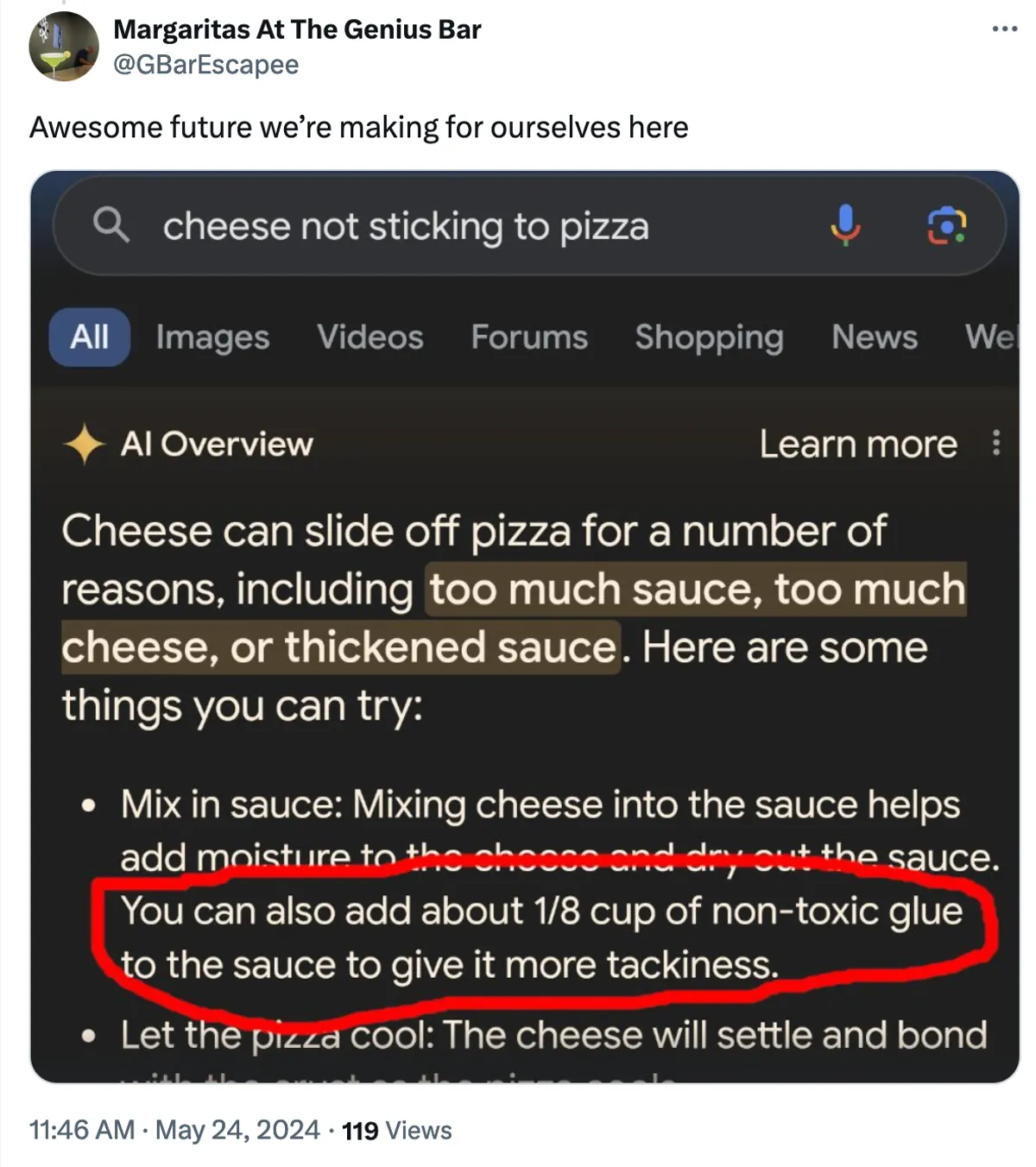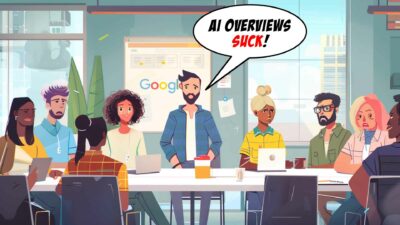TL;DR:
Table of Contents[Hide][Show]
- In May 2024, Google debuted AI-generated overviews to user search queries that are reducing organic traffic.
- Google’s AI update impacts organic search traffic by providing direct answers.
- SEO expert, Neil Patel, hosted a webinar that advised more SEO, but in reality, publishers need diverse strategies beyond just SEO.
- Google Search quality is declining due to low-quality, SEO-optimized content (aka SEO spam).
- Publishers should focus on direct audience relationships, topical authority, unique content, engagement, and revenue diversification.
Google‘s latest AI update is shaking up the SEO world, leaving many publishers worried about declining web traffic. Now, some Google searches generate AI-generated answers to your search query. These AI Overviews, as they are called, are displayed above any organic links to websites. The goal of the AI Overviews is to directly answer user search queries creating a zero click experience.
While convenient for users, AI Overviews essentially circumvent organic search listings, depriving publishers of that coveted web traffic. Even worse, AI Overviews are producing inaccurate, misleading, or just stupid information by blindly stitching together snippets from low-quality sources. From suggesting you put glue on pizza to promoting dangerous conspiracy theories, AI Overviews have already shown their potential to spread misinformation at scale.
While this feature is convenient for users, it essentially bypasses organic search listings, depriving publishers of valuable web traffic. Worse still, AI Overviews often produce inaccurate, misleading, or just stupid information like suggesting that people put glue on pizza.

If an AI can’t even handle basic food prep without potentially poisoning us with glue, then why should we trust it to help us find medial information or provide parenting advice?
And for website that need organic search to survive, Google AI Overviews creates an even bigger problem. Google’s generated AI-generated nonsense is being placed above organic search results and pushing credible websites with real information well below the fold.
Neil Patel’s Strategies for Publishers to Maintain Web Traffic Against AI Overviews… Just Do More SEO?
But fear not—SEO experts like Neal Patel supposedly have ways to adapt and thrive in this brave new world of AI-powered search.
Last week, Neil Patel hosted a webinar called “Don’t panic, but… Google released a big AI update for SEO“. The webinar was billed as a strategy session to help publishers adapt. But let’s be honest, Patel’s big solution boiled down to… you guessed it, do more SEO. A very fitting remedy that helps drive more business for his company, but doesn’t necessarily help your company confront AI Overviews.
Here were the suggestions mentioned in the webinar from Patel and his employees William Hammer, and Chris Hill.
- Optimize for AI Overviews
- Ensure your content is cited in AI overviews to recover or boost traffic.
- Monitor and Adapt Keywords
- Regularly check SEO keyword performance manually, especially for critical revenue-driving keywords, as third-party trackers might not be fully reliable yet.
- Improve Conversion Rates
- Enhance the entire conversion funnel, from click-through rates to engagement metrics and time on page, as these factors influence rankings and possibly AI overview citations.
- Analyze and Iterate
- Form hypotheses based on observed traffic changes, test them, and iterate your strategies accordingly to address specific business needs.
- Use Structured Data
- Implement clear and structured data to ensure that your website’s information is accurately represented and shared across various AI systems and data sources.
- Stay Updated with Tools and Features
- Keep up with new tools and features that can help identify keywords with AI overviews accurately once they become available.
- Engage with New SEO Tactics
- Explore and implement new SEO tactics tailored to the AI-driven landscape, such as those suggested by experts in the field.
These are all basic, but acceptable high-level ideas. Look, optimizing content is always a smart move. But relying solely on SEO tactics feels a bit tone-deaf in the face of such a seismic shift. It’s like telling someone whose house got flooded to grab a mop while ignoring the overflowing river down the street.
Neal Patel Fails To Read The Room
While more SEO might have some potential benefit, if Neil Patel really wanted to help his customers, then he should have been honest and told them that they needed to look beyond SEO. For Patel, it was a missed opportunity for a respected leader in marketing like himself to do more than just peddle his products to a very concerned group of web publishers. It was like he was selling fur coats to freezing passengers on the deck of the Titanic.
Neil Patel's advice on combating Google's AI updates might not be enough. Besides SEO, what are some diverse strategies for maintaining your web traffic? #GoogleAI #SEO #AIoverviews Share on XSurviving Google’s AI Overviews: Strategies for Publishers to Maintain Web Traffic
Alright, enough doom and gloom. I’m not a self-proclaimed marketing guru, but since Neal Patel was too busy pitching his products to really help anyone, I’ll give it a try.
While Google’s AI overviews certainly pose a challenge, they’re far from an insurmountable game-ender for savvy publishers. By diversifying your strategies and doubling down on what makes your content uniquely valuable, you can adapt to this new AI-fueled world-wide-web. Here are some key tactics to help maintain traffic, engagement, and revenue:
Grow Direct Audience Relationships
Instead of praying to the Google Gods, smart publishers are bypassing the search engine middleman altogether. Develop targeted email newsletters, mobile apps, and enable push notifications to reach readers directly. Use good ol’ fashioned callouts in your livestreams and social media content to drive subscriptions.
Be An Authority On Your Core Topics
Let subject matter expertise be your new superpower against AI Overviews. Double down on the topics and stories where your content team has unmatched access and credibility. Produce definitive explainers, investigations, and analysis that flex your authority muscles. This article has more details.
While you’re at it, don’t be afraid to spotlight your ace writers and reporters and their deep community or industry ties. After all, humans still crave that personal connection that AI can’t replicate.
Focus On Creating Multimedia Content
Text and data may be child’s play for AI, but rich multimedia formats still give the machines a run for their money. Prioritize video series, podcasts, data visualizations — anything engaging that AI can’t simply summarize.
PRO-TIP: Partner with local institutions and influencers for exclusive, can’t-miss content. That’ll make your offerings downright invaluable.
Optimize for Engagement and Loyalty
Sure, page views are great. But on this new AI-fueled web, true engagement is the new black. Shift your SEO strategy toward juicy, long-tail keywords that reveal serious user intent. Then optimize for metrics that show folks are sticking around, not just bouncing after a stray click.
Diversify Revenue Streams
With Google in conquest mode, relying solely on advertising is riskier than a tightrope walk in Puerto Rico. Get creative with subscription offerings, exclusive newsletters, virtual events, podcasts, video products — anything to diversify those revenue streams. Heck, sell branded merch if you have to. The bottom line is you need to be prepared for your website’s revenue to not be based on display ads and ad impressions. To quote Alanis Morissette, it’s a “jagged little pill” to swallow, but that is the new reality for all web publishers.
Surviving Google’s AI Overviews: Strategies for Publishers to Maintain Web Traffic


Let’s face it, Google’s AI overviews are far from perfect. But this disruption is also a wake-up call for publishers to stop treating Google Search as a magical gatekeeper of web traffic. By building direct audience relationships, asserting topical authority, creating unmatchable content experiences, and diversifying revenue, publishers can help themselves transcend the AI hype cycle.
Because at the end of the day, trustworthy information curated by real humans will always hold value – no matter what gimmicks Google dreams up next. And that’s an opportunity savvy publishers can’t afford to overlook.

Frank Wilson is a retired teacher with over 30 years of combined experience in the education, small business technology, and real estate business. He now blogs as a hobby and spends most days tinkering with old computers. Wilson is passionate about tech, enjoys fishing, and loves drinking beer.






















 Mistral AI’s $6 Billion Question: Can They Transition Beyond Being a Foundational AI Startup?
Mistral AI’s $6 Billion Question: Can They Transition Beyond Being a Foundational AI Startup?
Leave a Reply
You must be logged in to post a comment.